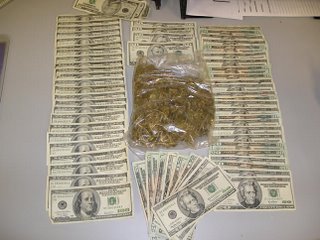
October 3, 2006
"Governor vetoes the legalization of hemp over the weekend
By TOM RAGAN
SENTINEL STAFF WRITER
WATSONVILLE — Gov. Arnold Schwarzenegger's weekend decision to veto a bill that legalized growing hemp in California was greeted with disdain by the state assemblyman who supported it.
The Santa Cruz County Farm Bureau also was frustrated with the veto, saying growers are always looking for viable crop alternatives, and that hemp could have been one given demand.
But Schwarzenegger, in a statement Saturday, said while he supports the development of new crops in the state, he felt he could not approve the legalization of hemp, a type of cannabis related to marijuana but without the euphoric effects: "Unfortunately, I am very concerned that this bill would give legitimate growers a false sense of security and a belief that production of 'industrial hemp' is somehow a legal activity under federal law."
State Assemblyman Mark Leno, D-San Francisco, introduced AB 1147 this year to reduce the reliance of U.S. man-ufacturers on imported hemp from Canada and China. Monday, Leno called the veto just "short of absurd."
"It's just another example of myth and politics trumping science and sound public policy," Leno said. "But we're not through yet. We're not going to give up. I'll probably try to introduce it again ... in January."
The bill passed both the Assembly and the Senate, with backers stressing that industrial hemp is a $300 million industry in the United States but that it cannot be grown here legally.
"Farmers could have made so much money by capitalizing on the popularity of the industry, but now they're just going to continue to lose it," Leno said.
Products made of hemp are common, and it can be found in clothes, food, snack bars, even paper. Proponents of the bill pointed to the U.S. Declaration of Independence, which was penned on hemp.
But the governor, with advice from the U.S. Drug Enforcement Administration, said there currently is no legal distinction between industrial hemp and marijuana, which contains tetrahydrocannabinols. THC creates euphoria when consumed; its production and consumption are outlawed by the federal government.
Any person wishing to grow hemp or marijuana must first obtain permission and register with the DEA. Failure to do so is a violation of federal law and subject to criminal penalties.
But Leno said there are huge differences between the two plants and that there was "no way" that law enforcement would have trouble distinguishing one from the other — a reservation expressed by bill opponents in Sacramento.
"What's the problem?" Leno said. "Marijuana grows 6 feet tall. Hemp grows as high as 16 feet. People plant marijuana 4 feet apart. Hemp is planted inches from one another. I don't know what was so difficult. They're two entirely different plants we're talking about here."
North Dakota is the only state that allows growing hemp for industrial purposes.
"You'd have to smoke a joint the size of telephone pole in order to get a headache," said Ken Junkert of the North Dakota Department of Agriculture in Bismarck.
The state's decision to legalize hemp was to diversify crops in a state where agriculture has taken a financial hit of late but still remains the No. 1 industry.
Hemp is a perfect plant, Junkert said, because it grows in all sorts of conditions and requires no pesticides or herbicides. It also serves as a rotational crop, putting nutrients back in the soil.
But even Junkert anticipates legal problems.
Though farmers can now apply for a license to grow hemp, he expects DEA opposition, which could lead to legal battles.
"We'll know in the next couple of months as farmers come in and start to apply for the permits," he said.
Contact Tom Ragan at tragan@santacruzsentinel.com."
--------------------------------------------------------------------------------
You can find this story online at:
http://www.santacruzsentinel.com/archive/2006/October/03/local/stories/03local.htm
--------------------------------------------------------------------------------













